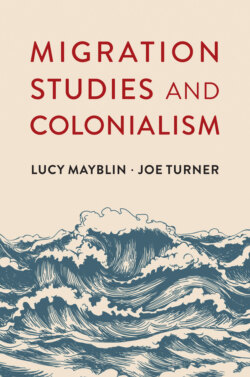Читать книгу Migration Studies and Colonialism - Lucy Mayblin - Страница 14
Eurocentrism
ОглавлениеThe concept of Eurocentrism is closely aligned with these discussions around contesting the dominant conception of modernity. Knowledge production – the questions that we ask, the hypotheses that we come up with, the research methods that we employ, the frameworks through which we interpret our findings, the places we publish and the audiences that will consume our ideas – emerges from historically contingent social conditions and contexts. Alatas (2006) argues that because some countries (for him, the United Kingdom, France and the United States) are ‘world social science powers’, scholars in Asia must engage with their frameworks and scholarship, even as scholars in the world social science powers can completely ignore scholarly debates happening within Asia (or indeed elsewhere) (see also Gamage 2016). This is because these powers generate large volumes of published social science output, are well funded to undertake research internationally, have global reach and hold a global prestige that makes them impossible to ignore. They have both the resources, and access to visas, to conduct international research projects and the social position to make their findings about a variety of contexts plausible. Indeed, even within the fields of postcolonial and decolonial scholarship, the most famous scholars internationally are more often than not based in Global North institutions (Cusicanqui 2012). We have, then, according to Alatas (2006), dominant producers of global knowledge, who can write with authority about anywhere, and peripheral consumers of global knowledge, who can only write with authority about particular places and when doing so must use the frameworks of the global knowledge producers. Even when research focuses on the Global South (or racialized, migrant communities in the Global North), this is all too often an extractive research process (see Tilley 2017). When scholars in the Global South are engaged with the power structures of global knowledge production, this often means that they are treated as empiricists or area specialists rather than producers of ‘theory’ (often still seen as universal and generalizable). Keguro Macharia (2016a) calls this ‘being area-studied’. This, briefly put, is what Eurocentrism amounts to in the global academy.
Intellectually, Eurocentrism is an orientation which puts some places (Europe and ‘the West’ more broadly) at the centre of world history as well as of contemporary knowledge production. Only upon entry into modernity do other places enter that world history (Dussel 1995). Eurocentrism therefore requires us to ignore connected histories, colonial interconnections and the actual role of the non-West in world history. But it also requires us to ignore non-European philosophical traditions and intellectual projects oriented to making sense of the world in which they found themselves – just as Europe’s philosophers were doing. Eurocentrism is about an orientation to a ‘normal’ political, philosophical, economic and historical reference point. That reference point may not be explicit; it may be implicit. But it would suggest, for example, that in thinking through moral arguments for immigrant inclusion or exclusion globally we look only at European-origin philosophers.
Eurocentrism is not therefore simply about a disproportionate focus on geographically European societies. Amin (1988: 185) charges that Eurocentrism incorporates ‘an inability to see anything other than the lives of those who are comfortably installed in the modern world’. Not seeing here is not the same as ignoring. Rather, it is not seeing people as themselves but instead seeing against the measuring-stick of the West. Gayatri Chakravorty Spivak (1988) has made an important contribution to this discussion in elaborating beyond the inability to ‘see’ to an inability to represent more broadly. In her seminal article ‘Can the Subaltern Speak?’ (also discussed in the Introduction), Spivak problematized the way in which the Third World subject is represented in western discourse. She argues that while western intellectuals often express a belief that subaltern groups understand their oppression and can speak for themselves, such an argument ignores the inaccessibility of the subaltern as a ‘subject’. For her, the subaltern is destined to remain mute as a result of mistranslations emergent from the relations of power involved in the colonial encounter. The ‘true’ self-conscious voice of the subaltern is therefore inaccessible because the subaltern, by virtue of being the subaltern, cannot speak in the ways demanded of her by western academics. Spivak therefore argues that academics too often present themselves either as objective observers of others or as allowing the oppressed to speak for themselves, rendering scholarly representations as unproblematic. What this hides, Spivak observes, is the economic, cultural and intellectual power relations that are at play in such representations, as well as the historically rooted institutional contexts, categories and worldviews in which academic observers are situated.
Singaporean scholar Sin Yee Koh (2015) argues that Eurocentrism in migration studies manifests itself in, amongst other things, a disproportionate focus on immigrant-receiving states in western countries and a dearth of studies which focus on the perspectives of sending contexts, except as a developmental concern. The continuity (as opposed to contemporary novelty) of migration patterns from former colonies in Asia to former metropoles in Europe, as well as between former colonies within Asia, is a particular area of scholarly silence, according to Koh. But, at the same time, concepts which are derived from ‘the Anglo-western experience’, such as typologies of different types of migrant, ideas of liberal citizenship or ideas of ‘development’ (discussed further below), are applied unthinkingly in other places as though they are universal and not context specific.
